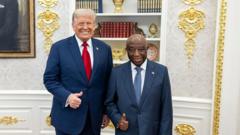In the face of escalating trade tensions with the United States, China's leadership is firm in its resolve not to capitulate to U.S. tariffs imposed by the Trump administration. This position arises not only from a sense of national pride but also from China's significant economic capacity to withstand pressure. Despite facing its own economic challenges, including a real estate crisis and high youth unemployment, the Chinese government promotes a narrative of strength and resistance against perceived bullying.
**China's Stance on Tariffs: A Defiant Position Amid Trade Tensions**

**China's Stance on Tariffs: A Defiant Position Amid Trade Tensions**
Beijing asserts its resilience against U.S. trade pressures, showcasing a robust strategy in response to Trump's tariffs.
China's trade with the U.S.—accounting for only 2% of its GDP—while substantial, is not critical enough to force compliance. Instead, Beijing has emphasized that U.S. exporters will feel the impact of its retaliatory tariffs, contradicting claims from the Trump administration that a trade war would lead to a quick capitulation by China. On the diplomatic front, Chinese leaders are actively engaging with other nations, including the EU, to bolster trade relationships and mitigate the impact of U.S. tariffs. President Xi Jinping recently met with Spanish Prime Minister Pedro Sanchez, reaffirming China's commitment to counteract unilateral U.S. actions while continuing to pursue partnerships beneficial to its economic goals.
Gendering its strategy, China seeks to establish broader international cooperation, as exemplified by discussions to remove European tariffs on Chinese vehicles, and aims to strengthen ties with countries affected by the tariff conflict. While the trade war appears to be entrenched, analysts suggest that the cyclical imposition of tariffs has led to a meaningful reduction in trade between the nations, rendering the tit-for-tat increasingly symbolic rather than impactful. The presence of historical references from China's past, such as Chairman Mao's resilient messages during the Korean War, signals Beijing’s serious and unwavering commitment to resisting U.S. pressures in the ongoing trade dispute.
Gendering its strategy, China seeks to establish broader international cooperation, as exemplified by discussions to remove European tariffs on Chinese vehicles, and aims to strengthen ties with countries affected by the tariff conflict. While the trade war appears to be entrenched, analysts suggest that the cyclical imposition of tariffs has led to a meaningful reduction in trade between the nations, rendering the tit-for-tat increasingly symbolic rather than impactful. The presence of historical references from China's past, such as Chairman Mao's resilient messages during the Korean War, signals Beijing’s serious and unwavering commitment to resisting U.S. pressures in the ongoing trade dispute.





















